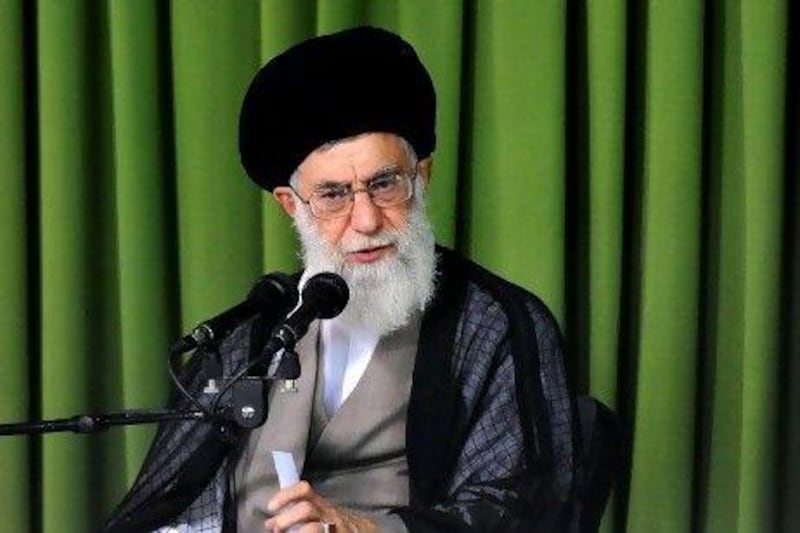Iran is preparing public opinion for possible concessions on its nuclear programme in renewed talks with six world powers.
Yesterday's sermon at Tehran University echoed positive statements by top regime officials, media outlets and other Friday prayer leaders.
Hojatoleslam Kazem Siddiqi said Iran was a "rational actor" that welcomes dialogue with its adversaries. If they, in turn, showed "logical behaviour", the outcome would be "good for all".
Iran's foreign minister, Ali Akbar Salehi, declared last week that Tehran was "ready to resolve all issues very quickly and simply".
On Tuesday he said initial talks in Istanbul earlier this month "came up with results that satisfied both sides", adding there would be "more progress" at the next round in Baghdad on May 23.
Ayatollah Ahmad Jannati, the hardline leader of Iran's Guardian Council, hailed the Istanbul meeting as a "good achievement" in a sermon in at Friday prayers in Tehran last week. And Ali Akbar Velayati, the top foreign policy adviser to Iran's supreme leader, Ayatollah Ali Khamenei, described the talks as a "positive step".
Both maintained the West had finally accepted Iran's right to enrich uranium, and Ayatollah Jannati warned that Tehran would break off negotiations if further sanctions were imposed.
The concerted message from Iran is that it has the upper hand and it is the West that will have to compromise.
It is not surprising that Iran is giving a self-serving spin to events as it jockeys for position before the Baghdad talks with the United States, Britain, France, Germany, Russia and China.
Tehran is saying "the West is realising that it has failed to force Iran to back down, that sanctions are not effective … and that it has recognised Iran's right to enriching uranium", said Muhammad Sahimi, an Iran expert at the University of Southern California.
Iran insists its atomic programme is solely peaceful. Ayatollah Khamenei recently reaffirmed his 1995 religious decree branding nuclear weapons a "grave sin" that were against Islamic principles.
US intelligence chiefs believe Tehran has not decided whether to seek a nuclear weapon but say Iran is keeping open the option by developing various capabilities to do so.
Iran's Fars News Agency, which is aligned with Iran's Revolutionary Guards, declared on Tuesday that Tehran "won the first" round in Istanbul. Sanctions, it argued, were merely hurting the US by driving up petrol prices. Removing them was the "only viable option" left for the US president, Barack Obama, to secure another term in the White House.
None of this means that Ayatollah Khamenei, although intensely mistrustful of the West and the US in particular, is ruling out a compromise, Mr Sahimi and other analysts said.
"Tehran is taking an approach that opens the path for possible compromise," said Farideh Farhi, an Iran expert at the University of Hawaii. Washington, she said, is putting its own gloss on the negotiations by suggesting "Tehran may give in to western demands because of the success of harsh sanctions". Both sides "have significant constituencies in their domestic environment that see compromise as appeasement and hence the need to be placated."
Analysts, however, caution against undue optimism for the next meeting in the Iraqi capital which will tackle substantive and contentious issues.
"The Iranians are playing a double game. They're emphasising that they're open to talks, which is very important," said Scott Lucas, an Iran expert at Birmingham University in England. "But that's not the same as saying they're ready to make a deal on the terms being offered by the US and Europe at this point."
Iran was clearly encouraged by remarks in Istanbul by Catherine Ashton, the EU's foreign policy chief who represents the six world powers. She said they had agreed to be guided by a "step-by-step approach and reciprocity". Tehran interpreted these buzzwords as meaning sanctions would be lifted for every concession it may make.
Equally crucial for Tehran, Ms Ashton said "a key basis" for the negotiations would be the Nuclear Non-Proliferation Treaty (NPT).
"That is as close as they [western countries] can get to saying that Iran has the right to enrichment but also saying there won't be demands made of Iran that go beyond the NPT," said Trita Parsi, a Iranian specialist in Washington.
The treaty requires member states to guarantee their nuclear activities are peaceful in return for enshrining their right to civil atomic energy.
The outlines for the first step of a deal have long been visible. Iran would relinquish enrichment of uranium to 20 per cent in return for fuel plates from abroad to power a research reactor in Tehran that produces medical isotopes for cancer patients. Purification to that level is just a few technological steps away from producing bomb-making material.
In return, the West would formally accept Iran's purifying uranium to 3.5 per cent to fuel civil nuclear reactors, provided that Tehran gives verifiable guarantees, including intrusive inspections, that no material is diverted to possible military use. Sanctions would be eased or suspended and eventually lifted.
The timing of any reciprocal moves could be highly problematic, however. "Iran seems to be saying the West must give a sign on sanctions before it makes any concessions," Mr Lucas said. "So far, the US and Europe are not making that move".
On the other main front, while the US has indicated it will agree to low-level uranium enrichment on Iranian soil given the right safeguards, it has yet to spell on out what scale.
Mr Lucas said: "That's going to have to be a matter for the negotiations."
mtheodoulou@thenational.ae





